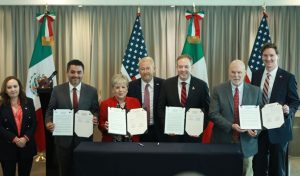 -Editorial
-Editorial
U.S. Environmental Protection Agency (EPA) Administrator Lee Zeldin and Mexico’s Secretary of Environment and Natural Resources Alicia Bárcena Ibarra met during the Council session of the Commission for Environmental Cooperation (CEC) to sign a new Memorandum of Understanding (MOU) aimed at resolving the decades-long sewage pollution crisis in the Tijuana River Valley.
The agreement outlines coordinated actions between the two governments to address the cross-border flow of untreated sewage from Tijuana into Southern California. For years, raw sewage discharges have contaminated the Tijuana River Valley, impacted beach access, degraded air quality, and posed public health risks for communities on both sides of the border.
The MOU builds on Minute 328, a binational agreement under the International Boundary and Water Commission (IBWC), and accelerates project timelines to complete Mexico’s outstanding infrastructure commitments by December 31, 2027. According to the agreement, Mexico will obligate the remaining $93 million previously earmarked for Minute 328 projects and initiate construction on two priority wastewater projects by the end of this year. These include a treated effluent diversion project and the rehabilitation of the Parallel Gravity Line, both expected to be completed by the end of 2025.
In response, the United States will release funding through the EPA’s Border Water Infrastructure Program (BWIP) to support the rehabilitation of Pump Station 1 and upgrades to the Tijuana River collection pipes. Additionally, the U.S. IBWC has committed to complete the expansion of the South Bay International Wastewater Treatment Plant (SBIWTP) from 25 to 35 million gallons per day (MGD) by August 28, 2025 — significantly ahead of schedule.
Both nations have agreed to develop a new Minute agreement by the end of 2025 that will establish additional actions to ensure a permanent and long-term resolution. Over the next 100 days, project schedules will be re-evaluated to expedite implementation.
The agreement is the result of ongoing negotiations following Administrator Zeldin’s April visit to San Diego, during which he met with local officials and toured affected areas of the Tijuana River Valley. The negotiations were carried out in collaboration with the U.S. Department of State, the National Security Council, and the Mexican government.
Officials from both countries emphasized that the agreement considers future population growth, ongoing maintenance, and binational cooperation to create a lasting solution to a public health and environmental issue that has persisted for decades.
San Diego Regional Chamber of Commerce President and CEO Chris Cate said the Tijuana River Valley crisis remains a serious threat to public health, the environment, and the region’s economy, adding that addressing the issue is a top priority for the Chamber. Cate praised EPA Administrator Lee Zeldin and Mexico’s Environment Secretary Alicia Bárcena for their leadership and commitment to accelerating infrastructure projects and aligning binational priorities. He emphasized the Chamber’s ongoing role in supporting long-term solutions, including during its upcoming delegation to Mexico City in October.


